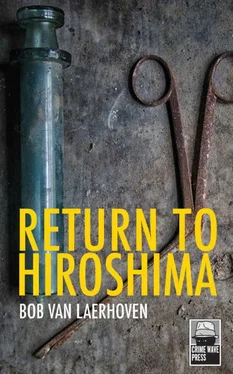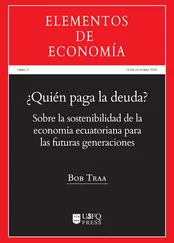“She’s innocent,” says Beate. “She told me everything.” She sees the scepticism in Takeda’s face and adds: “In spite of the language problem, I still think she’s telling the truth. I believe her.”
The Japanese girl had spent more than an hour in Beate’s hotel room trying to tell her story. Beate understood the gist of it. She was entranced by the dramatic images Yori’s story planted in her imagination. Yori’s account fascinated her, drawing her in bit by bit. She was convinced the young woman was genuinely afraid and saw no way out of the dangerous situation she was in. She decided to take Yori for a meal. They were just getting out of the lift when Inspector Takeda appeared. Beate was completely taken aback and blurted that the girl was the one who had driven the young Belgian to the hospital. Yori had turned at that point and was about to run away, but the high heels she was wearing slowed her down. Takeda took three steps in her direction and grabbed her arm. Beate was nervous and suggested that they all three go to dinner “to clarify the situation”.
To her relief the Inspector agreed. On their way to the restaurant, Beate caught herself fantasising about a photo session with Yori, her deformed hand in full view of the camera, provocative, seductive, skittish, a lizard woman. A new sensation creeps up on her in the restaurant. Beate feels attracted to the frail Japanese figure, her furtive glances, her slightly immodest pose – which is probably unconscious – a Lolita with a magnificent flaw. So many different sensations all at once , she thinks, and in such a short period of time . When she turns from Yori to the inspector she smells freshly laundered sheets and sees images of glorious decadent depravity. Takeda and the Japanese girl are deep in conversation. Beate sees hints of the inspector’s age in the wrinkles at the corners of his eyes. Otherwise he looks surprisingly good for a fifty-year-old. The way he moves his hefty, barrel-shaped body makes her think of the powers of nature, forceful, compelling. She stares at his broad face and tries to picture the old man he will later become. She chooses a garden with stone Buddha’s as background. It’s one of her hobbies. She’s convinced that when people reach a certain age the years start to swing back and forth like a pendulum between youth and future. She wants to picture the old Takeda as a classical Japanese monk, at peace with himself, a hint of sarcasm in his face. When she took photos of him during the fight with the Iranians she saw a metamorphosis that fascinated her. She already knows what she’s going to do with the photos when she gets back to her studio in Hamburg. She’s sorry she doesn’t have her laptop with her to sketch her ideas while they’re fresh in her mind. She doesn’t trust lcd screens and doesn’t like working with laptops because the resolution is usually crap and they don’t have enough capacity, although a colleague swears that nec are ready to release a 2 kilo laptop with a trial version of Windows 95 onto the market. Her prosaic train of thought is interrupted by the look of concentration that appears on Takeda’s face. He clenches his left hand into a fist. He’s aware that Beate is looking at him and that she’s surprised: “One door closes, another opens, Miss Becht. That’s life. Her boyfriend, the one you say was responsible for trying to kill the young Belgian, happens to be the nephew of the ceo of the Dai-Ichi-Kangyo Bank.” He sees that she doesn’t understand, his mouth slams shut, and he scowls as if he’s just inadvertently betrayed a secret.
Hiroshima – the Suicide Club squat – Kabe-cho – Mitsuko and Reizo – March 14 th1995
“Do you know what’s so tragic?” says the voice behind me. “I’ll tell you: my ego is bigger than my talent. I was determined to keep the information I received about you to myself, but I had to write it down, no way about it. Well, it looks as if I screwed up.”
I turn. Reizo looks grey and sickly in this light, slumped, as if his bones are crumbling as we speak. It’s not so much the pistol in his left hand, pointing in my direction, but his posture and bulging eyes that makes me think: Yori was wrong; he’s played the misunderstood crazy genius for so long it’s taken over his mind.
“I was twelve when I first read Mishima,” Reizo continues, talkative as ever. “I knew there and then that I had to surpass him or die. Hardly a thought for a kid of twelve, don’t you think? What else could the kid do? The insanity of Hamlet was his only option.”
“Hamlet’s insanity was feigned, Reizo.”
He raises his eyebrows. “How refined of you; how smart. You clearly read a lot on that island of yours. I like people who read. But then you should also know that you ultimately become what you’re pretending to be.”
I try to figure out where the conversation is leading and what he has in mind, but I draw a blank.
“You shuttle back and forth between reality and pretence and the show finally gets the better of you,” Reizo continues. “I thought of becoming a classical actor for a while. Our teacher used to insist that we put on the mask we were going to use in rehearsal before we arrived for class, that we had to become one with it, a complete transmutation. I was the best at it. But my storm god was a demon. Eventually, it took me by the throat.” Reizo grabs the mask of the storm god Raijin and holds it out in front of him like a lucky charm. “My feigned madness is worse than real madness. It’s a struggle for power, sublime, I’d even dare to call it divine . The best lunatics, feigned or real, never let anything get in their way.”
I notice how much he’s enjoying the rhetoric. Words for him are like brightly coloured magic stones. But he doesn’t use them to conjure new realities, he uses them to conjure new selves .
“I know what you think,” he blurts, self-satisfaction still written all over his face. “You think I’m a junkie, and worse, a talentless windbag. I agree with the junkie part…” He clenches his fist and pounds his heart. “… but I’m not sure how I should react to the talentless windbag charge. I said earlier that I’d like to get to know you better. You said ‘later’ when I asked about your life, as if I was a child fishing for candy. But I think your nosing about in my little basement office has introduced a touch of urgency into our relationship.”
I say nothing. I can’t fathom him. I try to figure out the best way to overpower him and escape.
Reizo grins. “I’ve had a fruitful afternoon, Mitsuko. Look at me: tossed around like a ragdoll by the daughter of a sort of god. Don’t say I’m wrong. The daughter of a powerful yakuza by the name of Rokurobei. I hope the undersecretary of the Brotherhood whose tongue I loosened with a fistful of drugs was telling the truth about you. Otherwise I would be very disappointed. Odd creatures, the people I work with, but handy all the same. They think I believe in their hocus pocus, but it’s nothing more than an interest in the phenomenon of sects. There are sects everywhere in Japan, thousands of them, and all because we’re two-faced, hide our true selves. Don’t you agree?” Reizo concludes with a self-satisfied grin. He waves his pistol in the air and strikes a self-mocking pose, although the pompous grandeur of a novice kabuki actor is simmering under the surface. “Beaten shitless by our Mitsuko here while the members of my club stood by and watched. What an honour!”
“How do you know?”
“What? About the beating?” He laughs. “I felt it.”
“That I’m Rokurobei’s daughter.”
Читать дальше












